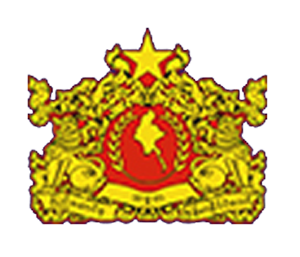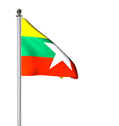Foreign Policy
Emergence Of Foreign Policy
2. To study the Foreign Policy of a State it is necessary to observe the basic objectives of its policy or its fundamental strategy. In adopting a Foreign Policy, States usually adopt one of the following principles:-
- isolationism
- non-alignment
- polarization
3. Myanmar, since achieving independence, and for quite some time thereafter, adopted and practised an “independent” and “non-aligned” Foreign Policy. Evolution of the objectives of this policy may be observed as follows-
- At the time of Myanmar’s independence, the international system has an Eastern and Western bloc, between which a “Cold War” was raging. It was also the time when colonial nations were regaining their independence. These newly independent states were in favour of adopting “independent” Foreign Policies,” “independent” in the sense of being totally free of outside influence.
- For Myanmar, which wrested independence with great difficulty, only an “independent” Foreign Policy was congruent with independence.
- Concurrently with independence, Myanmar faced an internal insurgency and therefore wished to avoid a disastrous contention on its soil between the Eastern and Western blocs. Hence it wished to be non-aligned between the two great blocs.
- At the time of independence, it was essential to prioritize on economic and social reconstruction. It was declared at that time that foreign assistance, without any strings attached from both sides, will be accepted.
- As Myanmar is geographically situated between two highly populous nations, India and China, it desired to be independent and non-aligned.
4. For the above mentioned reasons Myanmar consistently practised an Independent and non-aligned Foreign Policy.
Independent And Acitve Foreign Policy
5. Beginning in 1971 Myanmar transformed its independent and non-aligned Foreign Policy to an independent and active Foreign Policy. The State Law and Order Restoration Council , by its Declaration 3/88 of 18.9.88 promulgated that it would continue to adhere to the independent and active foreign policy. In practising its Independent and Active Foreign Policy, Myanmar will not align itself with any bloc on international issues except to consistently stand on the side that is right. Myanmar also actively participates in activities for world peace; opposes war, imperialism and colonialism; and maintains friendly relations with all countries.
6. Myanmar practises the Independent and Active Foreign Policy in accordance with the following principles:
- respect of and adherence to the principle of equality among peoples and among nations and the Five Principles of Peaceful Co-existence;
- taking a non-aligned, independent and just stand in international issues;
- maintaining friendly relations with all nations, and good-neighbourly relations with neighbouring countries;
- continued support of, and active participation in, the United Nations and its affiliated organisations;
- pursuance of mutually beneficial bilateral and multilateral cooperation programmes;
- regional consultation and beneficial cooperation in regional economic and social affairs;
active participation in the maintenance of international peace and security and the creation of an equitable economic order and opposition to imperialism, colonialism, intervention, aggression and hegemonism; - acceptance of foreign assistance which is beneficial to national development, provided there are no strings attached;
The Five Principles Of Peaceful Co-Existence
7. In 1954 Myanmar, China and India, during Chinese Premier Chou En Lai’s visit to India and Myanmar expounded the Five Principles of Peaceful Co-existence. Accordingly, on 28.6.1954 China and India signed in New Delhi and on 29.6.1954 Myanmar and China signed in Yangon, agreements to adhere to these Five Principles of Peaceful Co-existence. The Five Principles of Peaceful Co-existence are:
mutual respect for each other’s territorial integrity and sovereignty;
- to abide by mutual non-aggression;
- non-interference in each other’s internal affairs;
- respect for mutual equality and to work for mutual benefit; and
- peaceful co-existence
The above Five Principles of Peaceful Co-existence still steadfastly remain the main cornerstone of Myanmar Foreign Policy.
8. In matters of world affairs and international issues, in line with the principles and purposes of the United Nations and on the basis of the principles of Peaceful Co-existence, Myanmar has acted as follows;
actively participating in United Nations activities in accordance with its own basic principle;
- consistently supporting disarmament;
- opposing arms race, production and sales;
- supporting national liberation movements;
- supporting decolonialization;
- opposing aggression of imperialists;
- opposing colonialism, apartheid and racial discrimination;
- supporting efforts to ensure world peace; and
- opposing aggressive imperialistic wars.
Embassy Websites
Government Ministries
Daily News
Contact Details
P.O Box 337619,
971 - 4 - 285 9933, 971 - 4 - 286 0140
www.mcgdubai.org
Follow Us
© Copyright 2024 by Consulate General of the Republic of the Union of Myanmar in Dubai, UAE.

